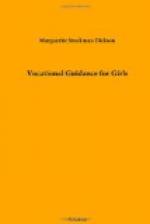Problems relating to the establishing of a home would once have been considered far from the province of the teacher in the public school. Formerly we taught our children a little of everything except how to live. Now we are realizing that the teacher should be a constructive social force. Living is a more complicated thing than it once was, and the school must do its share in fitting the children for their task. All these matters we have been considering—the selection of a home site, building, decorating, furnishing, sanitation, and all the rest—represent constructive social work the teacher may do, which, if she passes it by, may not be done at all. College courses should prepare the teacher for such work, but even the girl who is not college-trained will find, if she seeks it, help sufficient for her training. And the work awaits her on every hand.
CHAPTER IV
RUNNING THE DOMESTIC MACHINERY
With a home established, the problems confronting the homemaker become those of administration. The “place for making citizens” is built and ready. The making of citizens must begin.
One of the fundamental requisites for the efficient operation of the home plant is that the homemaker shall have a firm grasp upon the financial part of the business. To estimate the number of homes wrecked every year by lack of this economic knowledge is of course impossible; but you can call up without effort many cases in which this lack was at least a contributing element to the wreck.
Keeping expenditures within the income is only the ABC of the financial knowledge required, although, like other ABC’s, it is essential to the acquirement of deeper knowledge. It is not enough that the housekeeper merely succeeds in keeping out of debt. She must know what to expect in return for the money that she spends, and she must know whether or not she gets it. She must have definitely in mind the results she expects, and she must know why she spends for certain objects rather than for others.
In the days of famine and fear, the individual was fortunate who had food, shelter, and a skin to wrap about his shivering shoulders. In these days it is not enough to have merely these things. Certain standards of civilized life must be met, and we shall find that it requires judgment and skill to apportion our funds properly.
The common needs of civilized mankind are usually roughly classified as follows: food; shelter; clothing; operating expenses, including service, heat, light, water, repairs, refurnishing, and the general upkeep of the plant; advancement, including education, recreation, travel, charity, church, doctor, dentist, savings.




